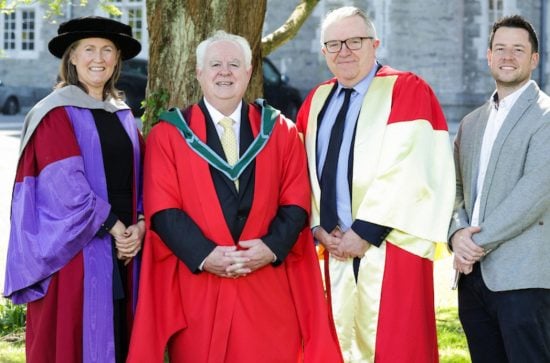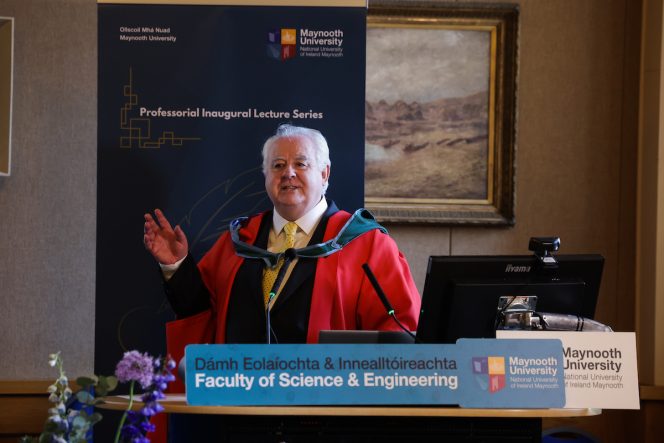
Prof Sean Doyle, a renowned researcher in molecular biotechnology, delivered his inaugural lecture at Maynooth University, titled Converting Ideas to Reality: The Challenge of Making Micro Impacts. The lecture marked a significant academic milestone for Prof Doyle, who was promoted to full professor in 2022.
In his lecture, Prof Doyle shared insights from his extensive research on infectious diseases, particularly focusing on his pioneering work with the fungal pathogen Aspergillus fumigatus, which poses a significant threat to immunocompromised patients. He discussed how Aspergillus can cause invasive pulmonary aspergillosis and other severe diseases, especially in patients with chronic obstructive pulmonary disease (COPD). Prof Doyle explained how the global health community now recognises Aspergillus fumigatus as a critical priority pathogen.
He also reflected on his previous work at Biotrin and Maynooth with Parvovirus B19, which he and his team helped to diagnose through innovative in vitro diagnostic systems, particularly in screening pregnant women and immunocompromised individuals. This breakthrough has had a lasting impact on public health, particularly in preventing fetal loss.
Throughout the lecture, Prof Doyle emphasised the importance of collaboration and innovation in scientific discovery. “The study of infectious disease is not just about understanding the pathogens but also about translating that knowledge into tangible outcomes for society," he said. He discussed how his research team utilised advanced technologies to explore the complexities of Aspergillus and its biosynthetic pathways, particularly the production of the toxic compound gliotoxin, which plays a key role in the pathogen's virulence.

Prof Doyle detailed the challenges of studying Aspergillus, noting that despite the sequencing of its genome nearly 20 years ago, it remains underdiagnosed and difficult to treat. “Immunocompromised patients are particularly at risk. Unfortunately, we saw during the COVID-19 pandemic that many patients did not die of COVID but of secondary fungal infections, one of which was Aspergillus," he remarked.
He further highlighted the broader implications of his work, which has led to new ideas about tackling antimicrobial resistance and the potential of fungal metabolites in fighting bacterial infections. Prof Doyle’s research on gliotoxin, for example, has opened up possibilities for identifying new drug targets to address antimicrobial resistance.
Opening the event, Prof Rachel Msetfi, Vice-President Research and Innovation, reflected on the significance of inaugural professorial lectures. “Inaugural lectures are an opportunity to celebrate academic excellence and provide a platform for professors to share their insights with the broader university community," she said. Praising Prof Doyle's work in molecular biology, she added: “Seán’s achievements have made a lasting impact on both science and society.”
Introducing Prof Doyle, Prof Paul Moynagh, Dean of the Faculty of Science and Engineering, shared his admiration for Prof Doyle’s work and commitment to advancing both research and education. “Seán’s impact extends far beyond his research. He has been instrumental in shaping the academic and research culture in our department and continues to mentor and inspire the next generation of scientists.”
Watch the full lecture and learn more about Prof Doyle's work.
